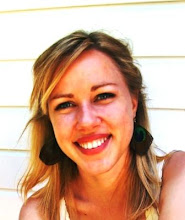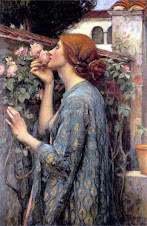
The bride is not dressed and no one has heard from the caterer. All at once, the front door opens, brimming the yellow foyer of the Reid Alumni House with the doused glow of a late winter sun. The delivery man in the doorframe is all impudence and zippered black leather, topped with a sprinkling of post-pubescent acne. He sulks beneath the white colonial columns with their grace of evergreen garlands.
You got a delivery from Teaism?” Part demand. Part question. All Brooklyn.
Aimee and Becky usher him in, relief etched into their faces; the rest of this exchange is hardly to be missed, but, hurrying up the curving staircase, I hear no more of the tea-delivering hoodlum.
Catherine stands in her customary pose, neck arched over her Blackberry screen while her fingers fly like a switchboard operator. It’s time for the dress, a tricky business. For a while we only study the tonnage of silk, judging the best point of entry. In the back, there is a complicated series of color-coded strings for forming the bussle. They look like parachute cords. For all I can tell, you could get married in this dress or jump into occupied territory with the 101st Airborne Division. Four college-educated women stare on, bemused, until Bethany intervenes. She has two married sisters; bussling is something of an expertise. Finally, wish a flustered fastening of dozens of groom-frustrating buttons, the deed is done.
We stop. Catherine stands there in her dress, silk flowing to the floor, and we take self-conscious pleasure in the sight of her, and ourselves with her, a woman on her wedding day among her friends. Something joyful and solemn and achingly tender steals into the narrow slice of time, and then all reverts to happy frenzy.
Catherine frets at the hem by her feet.
“It’s still too long,” she informs Lynn.
“Well,” replies Lynn pragmatically, “You’ll just have to grow, then, because there’s no time to shorten it.”
No time. That’s right. We have one hour (or is it less?), and the bride dispatches me across the campus to reroute the wandering florist. Up the narrow Georgetown street I walk, with its crumbling bricks and its postage-stamp gardens, past the primly painted pastel houses with shuttered glass, like demure antebellum ladies. The shadows lay themselves down early in the feeble afternoon, and I find the florist, heavy-laden, at the bottom of the concrete stairs along the service road. When I met Catherine, I lived seven stories straight up from here; but that was before graduation, before Baghdad, before Pearse, and before more things than can be told. There is an agreeable symmetry to things so far afield coming home again.
In Dahlgren Square, the fountain is silent beneath the bower of bare-limbed trees. The wedding guests soft-shoe up the steps into the Chapel in pairs and whispering clusters. The women clutch shawls against the chill breath of December. Beside the Chapel, a rough wooden crèche has been set up. Joseph, brooding and protective, and a blonde Madonna with skin like old piano keys kneel together on the hay. The manger lies empty for the Christ child to come. It is the eleventh hour, and they keep vigil.
Catherine waits outside the Chapel at the bottom of the steps, clutching her bouquet of blooming sunset-tinted roses. Her brother, Tommy, and her father, are there, immobile as two pillars, while Catherine hovers and flutters like a white moth. She will not let anyone see her, but she wants to supervise the delicate choreography of the processional. She sends Bethany and me up and down the stairs as reconnoiters. The groomsmen (where could they possibly be?) are not in their places, and what if the music cues prematurely and the bridal party starts down the aisle too soon?
Tommy, at least, is beside her and can be made to answer.
“Are you ready?” she asks.
His sotto voce reply holds equal parts teenage languor and brotherly affection: “I dunno.”
But the groomsmen have materialized in their proper places, and the heady strains of “Gesu, Joy of Man’s Desiring” come spilling out of the doorway. Bethany smoothes Catherine’s train into a lake of sheen. We heave open the cumbrous doors, and the wedding guests rise and crane their necks to see the processional. Her bridesmaids precede her with their pungent sprays of winter blooms and sprigs of eucalyptus. Leaving her father’s arm, she comes at last to her groom, and they sit side by side for the service.
In the Chapel, Gothic arches draw the eye upwards. Advent candles flicker in an unstill air, and the bride’s pinned hair gleams like spun bronze in their light. Father Scholl opens the service. An unbleached linen stole hangs around his shoulders, and a cord cinches his white robe around his middle. His hair has fled from the dome of his head, and as if to discipline the grey remnant, he keeps it cropped close to his skull. His ears are as large as collection plates. His voice reverberates from the ceiling, a gravelly, resounding echo like waters in a cavern, enough to lift the basest word to a homily. Next, on the lips of friends and relatives, come the words of the Apocrypha, the Canticle, and Revelations, pitting their ancient sobriety against the riotous Catholic pageantry all about us: the royal purple of Advent candles, gargoyle fantasies, and star-crowned saints frozen in their rhapsody in glass of saffron and aquamarine.
Father Scholl delivers the homily. Catherine fingers her bouquet absently; she wears her half-lidded, listening smile as she sits beside Pearse, handsome in his suit and his cranberry tie. (May no one remember what went in to the acquisition of that tie.) Father Scholl’s hands flex in lithe counterpoint to his ambling words. As he warms to his point, he quotes Michelangelo: “Lord, let me see your glory in every place.” Marriage, the priest affirms, is a golden opportunity to see the Maker’s glorious mark in these bodies of clay.
He moves on to the sacrament, calling the assembly to witness. Pearse stands to the priest’s right, Catherine to his left. Her tulle veil pours down her back like water fast-frozen. Pearse says his vows first with a voice confident, unstammering. His expression is intense and altogether happy. I have seen it like that once before, when he was lost in the strings of a mandolin in a June afterglow. Catherine follows him, blinking slowly as she speaks the binding words, as though she were reading them deep inside herself and announcing their truth to the witnessing world. The crucified Christ, suffering in wrought-iron love, looks on.
They exchange bands of gold for their left ring fingers. There, it was said in past years, lies the vein that runs straight to the heart. They kiss to a torrent of applause, and Catherine’s face blooms into her nose-crinkling laugh. She looks up at Pearse with bride-joy.
Father Scholl prepares to send us away. As Pearse has waited for his bride, he reminds us, and with joy received her, so pines the world for Christ and at Christmas receives Him. Then, the wedding guests pray “Our Father” with one straggling voice while the bells of Healy toll out a carol of benediction on the chilled winter air.
Catherine walks over the threshold on Pearse’s arm to the tune of a furiously happy harp song.
“
“
Is my veil okay?” she wants to know.
Back at the Reid Residence, a young man (I think it’s Pearse’s cousin) wanders around in a kilt. An older man in a grey suit, very pleased with his own wit, quips,
“What’s under the skirt?”
“I don’t discuss that in such formal settings,” replies the kilt-clad youth, not missing a beat.
In the corner of the music room, a thick-girthed Christmas tree twinkles with strands of alternating lights. A pianist and a violinist settle themselves with some difficulty in the corner, tuning to each other. First come the civilized chords of the piano, and then the keening cries of the violin, like a wild bird coaxed to sing to the written notes.
Ethan, Heather’s three year-old son, runs amok beneath the dour portraits of Jesuit priests. The guests cluster around the music and jam together at the food trays, nibbling on orange scones and crustless cucumber sandwiches. The women cross their legs on low settees, consigned to sit by their merciless stilettos, while their husbands and boyfriends cradle champagne flutes and practice their party jokes. We find old friends from this city of brief sojourns, friends who have wandered to graduate school or a new job or a new spouse. Or, as we sip our tea, we acquaint ourselves with strangers and test out our degrees of separation. There is a subtle competition as we rehearse aloud our relationships to the bride and groom. (Who has known them the longest, and who can tell the best stories?) Tension mounts. We are waiting for them, and the party cannot begin without their arrival. Tonight, I cherish a new vision of what heaven must be: a ravishing reception, glorious with anticipation for the Bridgeroom of Heaven to bring His Bride, radiant but hard-wooed and hard-won, over the threshold.
The kilt-wearer heralds their arrival with a flourish of bagpipe notes. In the high-ceiling entryway, the couple doles out hugs and smiles to a throng of well-wishers, who repeat one another without consciousness or qualm. Catherine’s cheeks flush with happiness and evening air, and perhaps a bit with champagne. She glows like a lit taper, and her dress flows beneath, billowing, as mellow and fluid as melted wax in the chandelier’s glow as she stoops to chat with Ethan.
The violin and the piano sing together again, like an earlier century. The whole wedding feels Victorian as the guests mill in the large, open house, an uncomplicated wedding of community, born of place, even in this city of transience.
The Baghdad gang mars this image somewhat. Their jokes all refer back to the Green Zone, and they discuss possibilities for the partition of Iraq between gulps of Darjeeling.
When it is time to cut the cake, Pearse feeds Catherine a strawberry smothered in white chocolate. A member of the Baghdad gang suggests that the cake was provided by the KBR.
“We had to have the initials taken off it first,” Pearse explains dead-pan.
No weapons of mass destruction were found in Iraq, the joke goes, because KBR fed them all to the Green Zone staff. The cake, however, is delicious.
I rest for a while in a corner. Ethan creeps up next to me, little-boy bored, and clambers into a regally-upholstered chair. He fiddles with a wooden nativity scene. Camels go flying; wise men fall prostrate. Suddenly, he puckers his lips in a frown and makes a befuddled announcement: “I’m wet,” as he watches a puddle collect on the chair and the floor.
Together, Heather and I look in vain for something absorbent. We finally settle regretfully on some lovely gold cake napkins, but desperate times call for desperate measures. I dash to the kitchen in search of cleaning products. The violin and the piano play on in a sonorous duet, and I hope the music covers my laughter, which the mortification on Heather’s face first bade me stifle. By the time I reach the kitchen, I am howling, head thrown back.
As the evening wanes, Pearse gathers Catherine into the music room. While the guests watch, he leads her in an abortive attempt at a waltz. There is less dancing than laughter, and finally none at all, as the piano and the violin surge bravely on. Bride and groom seem to care little for the steps, but they are husband and wife just two hours old, and they are young and glad. Just wait a little, and the steps will surely come.






